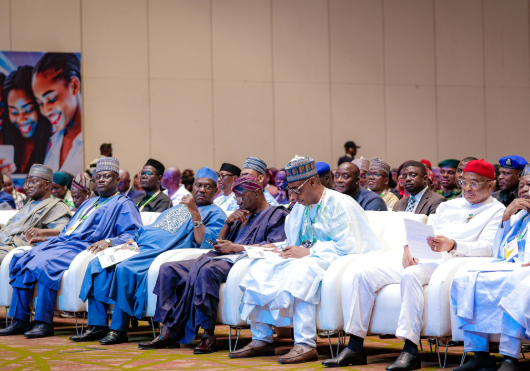BY MUHAMMAD GARBA
Participating in the just-concluded 3rd Federal Airports Authority of Nigeria (FAAN) National Aviation Conference (FNAC 2025) at the Eko Convention Centre in Lagos was an experience that truly left a deep impression on me. I have attended aviation events in previous years, but this one felt different. It felt like a genuine turning point of those rare moments where vision, expertise, and national ambition all converge in the same room.
The theme, “Elevating the Nigerian Aviation Industry through Investment, Partnerships, and Global Engagements,” was not just a slogan. It reflected the atmosphere in the hall from the very first session. As policymakers, industry leaders, investors, and aviation experts settled into their seats, there was a shared sense of purpose: Nigeria’s aviation sector is ready for a new era.
The assemblage of high-level dignitaries underscored that aviation is now recognised as a vital pillar of national development. Although President Bola Ahmed Tinubu was represented by the secretary to the government of the federation, George Akume, his message resonated clearly across the venue. Governors Babajide Sanwo-Olu and Babagana Zulum, minister of aviation Chief Festus Keyamo (represented by the permanent secretary, Ibrahim Abubakar Kana), the FAAN board led by Abdullahi Umar Ganduje, chairman/chief executive officer, Air Peace, Allen Ifechukwu Onyema; acting managing director/chief executive officer, Ibom Air George Uriesi; chief executive officer, Aero Contractors, Captain Abdullahi Zubair Mahmood and several captains of industry were all in attendance.
Advertisement
It is indeed an unmistakable sign of the sector’s strategic importance.
Under the stewardship of FAAN managing director, Olubunmi Oluwaseun Kuku, the first woman ever to hold the position, the conference highlighted the progress already underway. From infrastructure upgrades to improved safety systems and better passenger experience, it was evident that the sector is not just talking about reform; it is taking concrete steps toward it.
With more than two decades of experience in aviation and a bold goal of transforming FAAN into a top-tier airport authority in sub-Saharan Africa by 2035, Kuku has pushed technological innovation, strengthened service delivery, and taken disciplinary action to address misconduct among staff. Her global influence as Vice President, Airports Council International (ACI) for Africa and a permanent member of the ACI World Governing Body further places Nigeria on the map.
Advertisement
She also benefits from the support of an energetic and focused board led by Abdullahi Umar Ganduje, who brings previous aviation oversight experience from his time on the Board of the Nigeria Civil Aviation Authority (NCAA).
Still, FNAC 2025 reinforced a truth I have always believed: aviation cannot advance without collaboration. Every meaningful discussion, from regulators and airline operators to investors, innovators, and development partners, pointed to the same conclusion: progress requires joint effort. No single institution can transform the industry alone.
One aspect that particularly struck me was the conference’s integrative approach. For the first time, aviation experts were engaging closely with professionals from finance, tourism, and transport policy. Discussions on airport commercialisation, route expansion, cargo development, PPP models, and multi-modal transport showed clearly how aviation connects to broader national economic goals.
Passenger safety took centre stage, as expected. Strengthening regulatory compliance and investing in modern safety technologies remain central to building global confidence in Nigeria’s skies.
Advertisement
Tourism also emerged as a major opportunity. It became clear that if our airports become more efficient and better connected, Nigeria could welcome more visitors eager to explore our cultural heritage, natural sites, and vibrant cities.
A series of high-impact technical papers added depth to the conference. Topics included: “Enhancing Air Connectivity and Route Development in Africa: Unlocking Nigeria’s Aviation Potential”, “Airline Profitability and Cost Optimisation”, among others.
Collectively, these presentations painted a realistic yet inspiring picture of what lies ahead.
Another memorable moment for me was the career fair. Watching young people full of hope, exploring opportunities in engineering, aviation management, safety, and tourism, strengthened my belief that Nigeria’s future aviation workforce is ready and capable.
Advertisement
Sustainability also took a prominent place in the discussions. The focus on reducing carbon emissions, modernising fleets, and building environmentally responsible airport infrastructure reassured me that Nigeria is committed to global best practices.
Reflecting on the overall experience, FNAC 2025 was far more than just another industry gathering. It was a milestone that celebrated how far we have come, acknowledged the challenges ahead, and presented a clear roadmap for long-term transformation.
Advertisement
The real work now is sustaining the momentum. If the partnerships, insights, and strategies from this conference are implemented with consistency, Nigeria has every potential to become a leading aviation and tourism hub, not only in Africa but globally.
FNAC 2025 reminded me of something powerful: in aviation, the sky has never been the limit; it is simply the beginning.
Advertisement
Garba is the former chief of staff to the APC national chairman/former commissioner for information, Kano state
Advertisement
Views expressed by contributors are strictly personal and not of TheCable.
